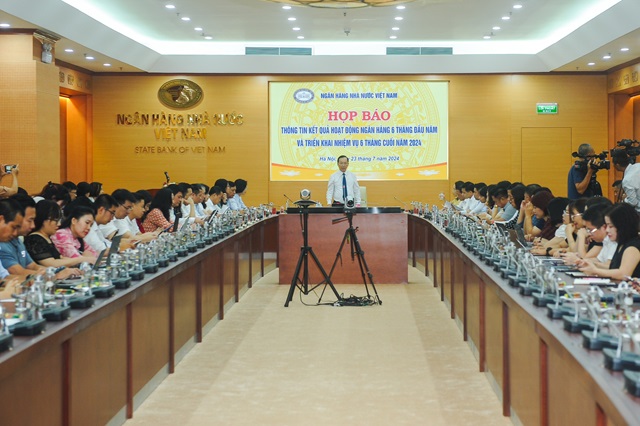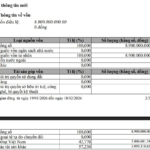 |
A press conference for the banking sector was held on the morning of July 23, 2024.
|
Mr. Dao Minh Tu, Deputy Governor of the State Bank of Vietnam (SBV), reported that in the first six months of 2024, the global economy continued to face challenges, with uneven growth across countries and regions due to tight financial conditions, geopolitical conflicts, and heightened financial risks. The US Federal Reserve maintained high-interest rates longer than market expectations, and the divergence in monetary policy stances among central banks led to currency depreciation in many countries.
The domestic economy has shown positive signs of recovery, and inflation has been stable, but it continues to face challenges due to global economic influences and domestic issues.
The banking sector has achieved several results in the first half of the year:
First, monetary policy management has contributed to macroeconomic stability and inflation control. Liquidity support has been provided to credit institutions, maintaining stability in the money and foreign exchange markets.
Second, in terms of interest rate management, the SBV has maintained its operating interest rates to enable credit institutions to access low-cost funding from the SBV and support the economy. Meanwhile, the SBV has instructed credit institutions to reduce costs to lower lending rates and required them to publicly disclose average lending rates, deposit-lending rate differentials, and information on lending rates for credit packages, programs, and products on their websites to provide customers with more information when accessing loans.
Third, the SBV has flexibly managed the exchange rate in line with domestic and international developments, helping to absorb external shocks, maintain stability in the foreign exchange market, and limit significant short-term fluctuations in the exchange rate, thus preserving the value of the currency. Liquidity has remained smooth, and legal foreign currency demands have been met fully.
Fourth, the SBV has implemented various solutions, policies, and credit programs synchronously and decisively to ensure sufficient capital supply to the economy and promote economic growth.
To facilitate credit institutions in providing capital to the economy, on December 31, 2023, the SBV allocated the entire credit growth target for 2024 to credit institutions and publicly announced the determination principles for their proactive implementation. The SBV has continuously issued directives to credit institutions to actively implement credit growth solutions from the beginning of the year and requested units within the SBV, credit institutions, and SBV provincial branches to fully and seriously implement the Prime Minister’s directions to further promote effective credit growth in 2024.
Moreover, to enhance access to formal credit and protect the legitimate rights and interests of individuals and enterprises borrowing from credit institutions, the SBV has proactively implemented multiple specific solutions. These include providing advice on issuing the Law on Credit Institutions in 2024 and completing guiding documents related to lending activities to facilitate credit institutions’ operations, meet the borrowing needs of individuals and enterprises, and align with economic development trends, as well as improving access to bank credit. The SBV also issued Circular No. 06/2024/TT-NHNN dated June 18, 2024, extending the implementation period of the policies in Circular No. 02/2023/TT-NHNN on debt rescheduling and debt classification until December 31, 2024. Additionally, the SBV organized an online conference for the entire banking sector on promoting bank credit to support businesses and boost economic growth in 2024 (on February 20 and June 19, 2024) and worked directly with some localities on credit activities in 2024 to assess credit operations, address difficulties and obstacles in accessing and absorbing capital in these areas, and promote the implementation of the program connecting banks and enterprises. Credit institutions have also been instructed to enhance lending for consumer needs by utilizing the national population database provided by the Ministry of Public Security and promoting lending through electronic and online channels.
With the banking sector’s synchronized solutions, as of June 28, 2024, credit to the economy increased by 6% compared to the end of 2023, focusing on economic growth drivers and new trends such as green credit. Credit institutions have also actively implemented various credit programs, including the VND 120,000 billion program for social housing and worker housing loans and projects to renovate and rebuild apartment buildings, the credit program for the forestry and fisheries sectors, policy credit, and national target programs.
Fifth, in managing gold trading activities, with the Government’s attention and direction, the SBV’s synchronized solutions, and the coordination of relevant ministries and sectors, the gap between domestic SJC gold bar prices and world gold prices has narrowed significantly. The selling price of SJC gold bars in the domestic market has dropped sharply, with a difference of over VND 5 million per tael compared to world prices. The initial goal of handling and controlling the price difference of SJC gold bars compared to world gold prices within an appropriate range has been achieved.
Sixth, the stability and safety of the credit institution system have been maintained, ensuring the legitimate rights and interests of depositors. Bad debt has been focused on handling and controlling in the context of economic difficulties and business production challenges affecting enterprises’ debt repayment capacity.
Seventh, the legal framework, mechanisms, and policies for cashless payment activities and digital banking have been continuously supplemented and improved, creating synchronization and favorable conditions for the development of cashless payments and digital banking, promoting the application of new technologies, and ensuring security and safety in payment activities. Additionally, the banking sector has intensified communication and financial education to enhance the public’s knowledge and skills in accessing and using banking services in the online environment. As a result, cashless payments and digital transformation in the banking sector have achieved positive outcomes.
Eighth, the legal system for currency and banking activities has been given due attention and further improved to ensure the safe operation of the banking system and keep up with practical requirements, international trends, standards, and practices. On January 18, 2024, the XV National Assembly passed the Law on Credit Institutions No. 32/2024/QH15, which took effect on July 1, 2024. The SBV is currently working on amendments and supplements to the detailed guiding documents for the Law on Credit Institutions 2024 to ensure its synchronous implementation with the Law’s provisions.
Tasks for the Last Six Months
According to the Deputy Governor of the SBV, in the last six months of the year, despite challenges, the banking sector will continue its efforts to accomplish the set goals.
The SBV will manage interest rates in line with macroeconomic balances, inflation, and monetary policy objectives and continue to instruct credit institutions to reduce costs to lower lending rates.
It will also flexibly manage the exchange rate to stabilize the foreign exchange market and contribute to macroeconomic stability and inflation control.
The SBV will manage credit growth volume and structure reasonably, meeting the capital needs of the economy to help control inflation and support economic growth. It will continue to review and complete the legal framework to facilitate capital supply and access to bank credit. Additionally, it will promote specific credit programs and policies, address difficulties for businesses and people, and closely control credit in potential risk areas.
The SBV will also vigorously and effectively implement the Scheme for “Restructuring the system of credit institutions associated with handling bad debts in the 2021-2025 period” to develop a healthy, qualitative, effective, transparent, and public credit institution system that meets international standards and practices. It will also promote bad debt handling, enhance credit quality, and prevent and minimize new bad debts. The SBV will effectively implement the Plan for Digital Transformation in the Banking Sector until 2025, with a vision towards 2030, the Scheme for Non-Cash Payments in Vietnam for 2021-2025, and the Strategy for Information Technology Development in the Banking Sector until 2025, with a vision towards 2030. It will continue to research and complete the legal framework for the payment area, creating a legal basis for developing new payment models and services. Additionally, it will coordinate with the Ministry of Public Security to implement Scheme 06 and enhance security and safety.
By Cat Lam
Avoid Out-of-Stock, Hoarding, and Disruptions in Supply Chain Leading to Price Surges
In line with the 2024 mission directive, the Government has set a goal to prevent shortages, hoarding, and disruptions in the supply chain that result in sudden price surges.

















